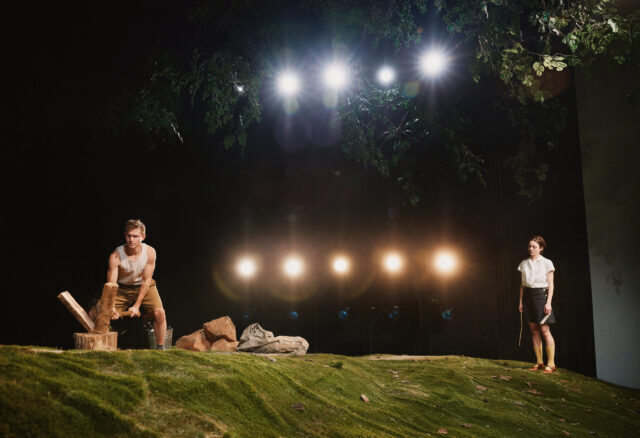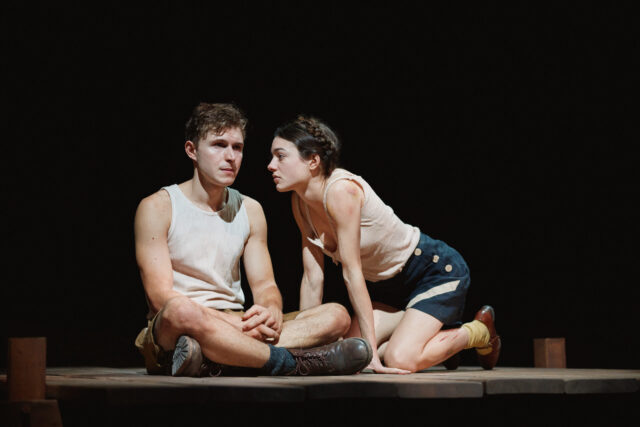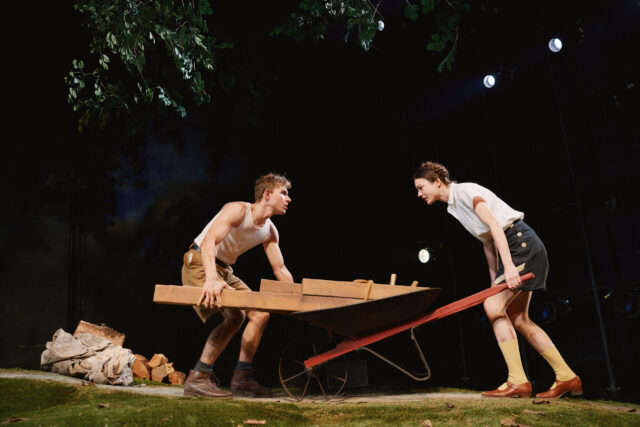
A seventeen-year-old boy (Johnny Berchtold) chops wood as a sixteen-year-old girl (Lily McInerny) watches (photo by Emilio Madrid)
CAMP SIEGFRIED
Tony Kiser Theater
305 West 43rd St. between Eighth & Ninth Aves.
Tuesday – Sunday through December 4, $56-$107
2st.com/shows
Tony-nominated playwright Bess Wohl has a penchant for setting her plays in singular, fictional locations where the characters are cocooned from the rest of the world, oddly constructed outdoor microcosms that also comment on society at large. Her 2015 hit Small Mouth Sounds takes place at a silent retreat in the woods, while Continuity unfurls on an isolated movie set in the New Mexico desert re-created to look like a doomed Arctic glacier.
Her latest play, Camp Siegfried, making its US premiere at Second Stage’s Tony Kiser Theater, transpires at a 1930s summer camp on Long Island run by the German American Bund. Incredibly, it’s based on reality. During the pandemic lockdown, Wohl and her family escaped their Brooklyn home and stayed near Yaphank. Surfing the web to find things to do with her three children, Wohl learned about Camp Siegfried, which from 1936 to 1941 served as a gathering place in Yaphank for German Americans to support the Third Reich, holding Nazi indoctrination programs and encouraging young men and women to hook up and create the next generation of Aryans.
It’s 1938, and a shy, mousy sixteen-year-old girl (Lily McInerny) is standing by herself, holding a large mug of beer. She is approached by a bold seventeen-year-old boy (Johnny Berchtold) who instantly chats her up. (The two are never given names.) She is from Baltimore, attending the camp for the first time, while he is a regular, his father a bigwig in the Bund. Brett J. Banakis’s marvelous set is a large grassy hill with a deep valley, tree branches overhead, and a narrow dirt path running from bottom to top across the stage.

He (Johnny Berchtold) and she (Lily McInerny) grow close in new Bess Wohl play (photo by Emilio Madrid)
“My aunt / She thinks I need to get more physical exercise / Move around more,” she explains. “Things fester in dark spaces is what she says / And I think by dark spaces she just means Baltimore.” Wohl is referring to a lot more than just a city in Maryland.
She says she doesn’t dance, can’t swim, and doesn’t like crowds, ghost stories, or the ocean; she’s scared of just about everything. He is intent on displaying his strength and superiority, feeling he has something to prove because he’s the runt of his family. He calls her “dummy,” since she has so much to learn. When she doesn’t express pride in her heritage, he gets mad at her, decrying, “Being German / You look all hangdog about it / ‘My mom is . . .’ / What are you ashamed of / We’ve got Oktoberfest / Beer / Hamburgers / Hot dogs.” He claims that Christmas, Santa Claus, and kindergarten are all German inventions, but since WWI, Germans have been mistreated, stigmatized as “Barbarians” and “Huns.”
While he splits logs and shows off his muscles, determined to demonstrate to his father that he has “Kampfgeist” — “Kampf is struggle / Geist is spirit / The spirit of the fight / We’re supposed to have it” — she accumulates cuts and bruises on her legs, gossips about the boys and girls who disappear in pairs into the woods at night, and expresses her admiration for the romantic story of Siegfried and Brunhilde in Valhalla that ends with a funeral pyre. Wohl does not have to remind us that the tale was made famous in the epic opera Der Ring des Nibelungen by renowned German anti-Semite Richard Wagner.
They start growing closer as they work together to build a wooden platform where specially selected youths will give speeches on German Day, in front of tens of thousands of people. He thinks she would be a great choice to represent the girls as they all await what her aunt Linda calls “the Day of Freedom . . . When we storm the government / And fight back.” The two teens share stories with each other that indicate there is more to them than what is on the surface while also revealing vulnerabilities that make them ripe to fall under the lure of Hitler-style extremism. But each of them undergoes a transformation that alters the dynamics of their relationship and just what they are building together.

An unnamed pair of teenagers (Johnny Berchtold and Lily McInerny) work together at Camp Siegfried (photo by Emilio Madrid)
In their professional New York stage debuts, McInerny and Berchtold are thoroughly engaging, superbly capturing the many changes their characters undergo in a short period of time, as weakness becomes strength and vice versa. Christopher Darbassie’s sound design includes offstage chattering of the other camp attendees as well as the chirping of birds and other nature elements, in addition to the blasts of guns during target practice; Tyler Micoleau’s lighting creates long shadows that hover over the teens, who wear summery costumes by Brenda Abbandandolo.
Camp Siegfried is a modest play by Tony nominee Wohl, who is a mix of Jewish, Mormon, and Irish Catholic; her husband is Jewish, and they are raising their children Jewish. The eighty-five-minute narrative unfolds quietly under the almost elegiac direction of Tony winner David Cromer (Our Town, The Band’s Visit), a mostly secular Jew from Skokie, Illinois, where a Nazi group famously marched in 1977; Cromer confronted his own feelings about anti-Semitism when he directed Joshua Harmon’s Prayer for the French Republic earlier this year, as he told the Forward.
Prayer travels back and forth between 1944–46 and 2016–17, as a family deals with the Nazi occupation of Paris seventy years before as well as the growing anti-Semitism in the twenty-first century. Camp Siegfried tackles similar themes; the play ends a few months before Kristallnacht, which is unleashed in November 1938, leading the way to the Holocaust.
An extraordinarily talented writer, Wohl (Grand Horizons, Make Believe) makes subtle hints that bring the story into modern times, as much of the camp rhetoric evokes QAnon-type conspiracy theories involving racism, anti-Semitism, militia training, and plans to overthrow the government by force. As the girl is told in the play, “Anybody can fall into anything really / Anyone can be seduced. . . . Never underestimate your / Infinite capacity for delusion.” As we’ve seen from the January 6 insurrection at the Capitol to heavily armed Brownshirt-like figures hanging around ballot boxes this month, such seduction and delusion can happen anywhere, at any time.